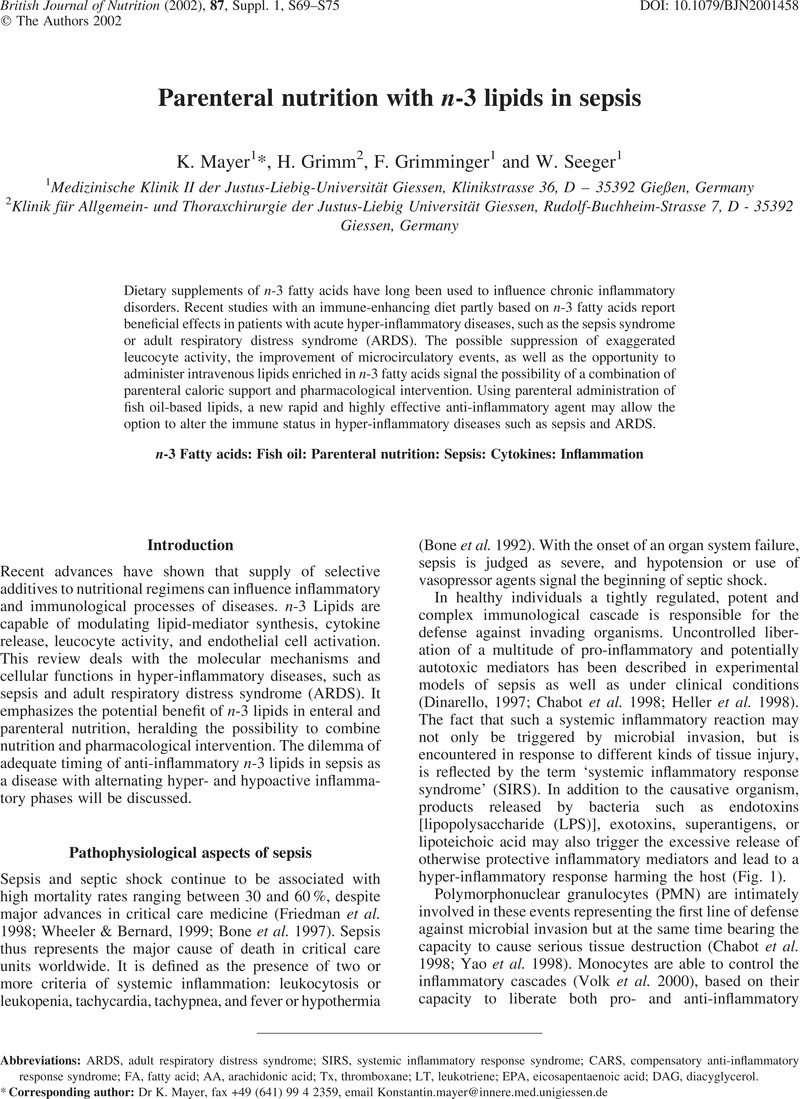Crossref Citations
This article has been cited by the following publications. This list is generated based on data provided by Crossref.
Fusch, Cristoph
2002.
Who needs NS?.
Clinical Nutrition,
Vol. 21,
Issue. ,
p.
139.
Yaqoob, Parveen
2003.
Lipids and the immune response: from molecular mechanisms to clinical applications.
Current Opinion in Clinical Nutrition and Metabolic Care,
Vol. 6,
Issue. 2,
p.
133.
Mayer, Konstantin
Meyer, Sandra
Reinholz-Muhly, Marion
Maus, Ulrich
Merfels, Martina
Lohmeyer, Jürgen
Grimminger, Friedrich
and
Seeger, Werner
2003.
Short-Time Infusion of Fish Oil-Based Lipid Emulsions, Approved for Parenteral Nutrition, Reduces Monocyte Proinflammatory Cytokine Generation and Adhesive Interaction with Endothelium in Humans.
The Journal of Immunology,
Vol. 171,
Issue. 9,
p.
4837.
Stein, J.
2003.
Praxishandbuch klinische Ernährung und Infusionstherapie.
p.
484.
Jho, David H.
Cole, Shawn M.
Lee, Ellyn M.
and
Espat, N. Joseph
2004.
Role of Omega-3 Fatty Acid Supplementation in Inflammation and Malignancy.
Integrative Cancer Therapies,
Vol. 3,
Issue. 2,
p.
98.
Singer, Pierre
and
Cohen, Jonathan D.
2005.
From immune-enhancing diets back to nutritional-enhancing diets.
Nutrition,
Vol. 21,
Issue. 2,
p.
282.
Kelley, Darshan S.
Hubbard, Neil E.
and
Erickson, Kent L.
2005.
Vol. 50,
Issue. ,
p.
101.
Sakurai, Yoichi
Oh-oka, Yuriko
Kato, Shiho
Suzuki, Sadamu
Hayakawa, Mariko
Masui, Toshihiko
Yoshida, Ikuo
Tonomura, Shuhei
Mitsutaka, Shoji
Nakamura, Yasuko
Uyama, Ichiro
Komori, Yoshiyuki
and
Ochiai, Masahiro
2006.
Effects of long-term continuous use of immune-enhancing enteral formula on nutritional and immunologic status in non-surgical patients.
Nutrition,
Vol. 22,
Issue. 7-8,
p.
713.
Mayer, Konstantin
Schaefer, Martina B
and
Seeger, Werner
2006.
Fish oil in the critically ill: from experimental to clinical data.
Current Opinion in Clinical Nutrition & Metabolic Care,
Vol. 9,
Issue. 2,
p.
140.
Cury‐Boaventura, Maria Fernanda
Gorjão, Renata
de Lima, Thaís Martins
Piva, Tatiane Maria
Peres, Carmem Maldonado
Soriano, Francisco Garcia
and
Curi, Rui
2006.
Toxicity of a Soybean Oil Emulsion on Human Lymphocytes and Neutrophils.
Journal of Parenteral and Enteral Nutrition,
Vol. 30,
Issue. 2,
p.
115.
Andersson, Roland
Axelsson, Jakob
Norrman, Gustav
and
Wang, Xiangdong
2006.
Gut barrier failure in critical illness: Lessons learned from acute pancreatitis.
Journal of Organ Dysfunction,
Vol. 2,
Issue. 2,
p.
93.
Andersson, R.
Andersson, B.
Andersson, E.
Eckerwall, G.
Nordén, M.
and
Tingstedt, B.
2006.
Immunomodulation in surgical practice.
HPB,
Vol. 8,
Issue. 2,
p.
116.
Wanten, Geert
2006.
An update on parenteral lipids and immune function: only smoke, or is there any fire?.
Current Opinion in Clinical Nutrition & Metabolic Care,
Vol. 9,
Issue. 2,
p.
79.
Lee, Sang
Gura, Kathleen M.
Kim, Sendia
Arsenault, Danielle A.
Bistrian, Bruce R.
and
Puder, Mark
2006.
Current Clinical Applications of Ω‐6 and Ω‐3 Fatty Acids.
Nutrition in Clinical Practice,
Vol. 21,
Issue. 4,
p.
323.
Kohl, Martina
Wedel, Thilo
Entenmann, Andreas
Stuttmann, Julia
Bendiks, Meike
Loff, Steffan
Köster, Stefan
Ortfeld, Stefan
and
Bos, Inge
2007.
Influence of Different Intravenous Lipid Emulsions on Hepatobiliary Dysfunction in a Rabbit Model.
Journal of Pediatric Gastroenterology and Nutrition,
Vol. 44,
Issue. 2,
p.
237.
Heller, Axel R.
Stengel, Stefanie
Stehr, Sebastian N.
Gama de Abreu, Marcelo
Koch, Rainer
and
Koch, Thea
2007.
Impact of the ratio of intravenous omega-3 vs. omega-6 polyunsaturated fatty acids in postoperative and in septic patients—A post hoc database analysis.
e-SPEN, the European e-Journal of Clinical Nutrition and Metabolism,
Vol. 2,
Issue. 5,
p.
e91.
Sakurai, Yoichi
Masui, Toshihiko
Yoshida, Ikuo
Tonomura, Shuhei
Shoji, Mitsutaka
Nakamura, Yasuko
Isogaki, Jun
Uyama, Ichiro
Komori, Yoshiyuki
and
Ochiai, Masahiro
2007.
Randomized Clinical Trial of the Effects of Perioperative Use of Immune‐enhancing Enteral Formula on Metabolic and Immunological Status in Patients Undergoing Esophagectomy.
World Journal of Surgery,
Vol. 31,
Issue. 11,
p.
2150.
Farrell, Michael K.
and
Bucuvalas, John C.
2007.
Liver Disease in Children.
p.
897.
Wichmann, Matthias W.
Thul, Paul
Czarnetzki, Hans-Dieter
Morlion, Bart J.
Kemen, Matthias
and
Jauch, Karl-Walter
2007.
Evaluation of clinical safety and beneficial effects of a fish oil containing lipid emulsion (Lipoplus, MLF541): Data from a prospective, randomized, multicenter trial*.
Critical Care Medicine,
Vol. 35,
Issue. 3,
p.
700.
Sabater, Joan
Masclans, Joan Ramon
Sacanell, Judit
Chacon, Pilar
Sabin, Pilar
and
Planas, Merce
2008.
Effects on hemodynamics and gas exchange of omega-3 fatty acid-enriched lipid emulsion in acute respiratory distress syndrome (ARDS): a prospective, randomized, double-blind, parallel group study.
Lipids in Health and Disease,
Vol. 7,
Issue. 1,



